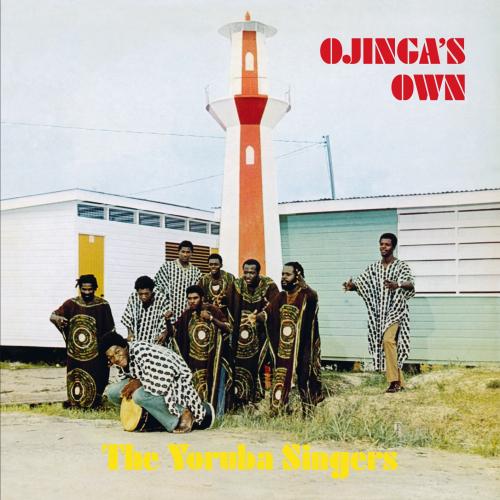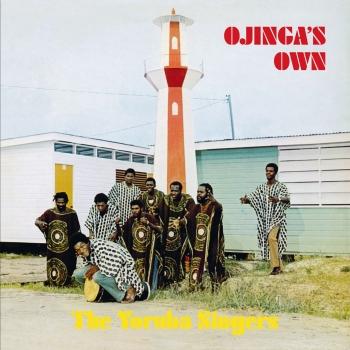
Ojinga's Own (Remastered) Yoruba Singers
Album Info
Album Veröffentlichung:
2023
HRA-Veröffentlichung:
14.07.2023
Das Album enthält Albumcover
- 1 Ojinga's Own 04:39
- 2 What To Do 02:08
- 3 Stay Away 02:30
- 4 G.o.-Go 02:24
- 5 Uncomprehensidensible Radio-Matic Woman 04:10
- 6 Neighbour Jean 02:20
- 7 Massacura Man 03:39
- 8 Woman A Dead Ya Fuh Man 02:47
- 9 Ka Duma 03:53
- 10 I've Got To Be Somebody 03:36
- 11 No Intention 04:23
- 12 Basa Bongo 03:19
- 13 Black Pepper 03:02
Info zu Ojinga's Own (Remastered)
Das Debütalbum Ojinga's Own von 1974 und die Single Basa Bongo/Black Pepper der guyanischen Afro-Folk-Band The Yoruba Singers wurden für Vinyl und digital neu gemastert.
Die Yoruba Singers wurden 1971 in Georgetown, Guyana, gegründet. Trotz ihres Namens stammten sie nicht aus Nigeria, sondern identifizierten sich stark mit dem Gebiet, aus dem so viele Mitglieder der afrikanischen Diaspora in Guyana und den Nachbarregionen ursprünglich stammten.
Die Gruppe begann, die traditionelle Volksmusik Guyanas zu adaptieren und ihre eigene Musik zu schreiben - eine Mischung aus Protest, sozialem Kommentar, Blues und von der Zeit inspirierten Genres. Zu Beginn teilten sich 12 Personen die Gesangsaufgaben, und der größte Teil des frühen Repertoires wurde von Volksliedern inspiriert, die ursprünglich auf Plantagen oder in religiösen Zusammenhängen entstanden und von einigen wenigen Musikinstrumenten begleitet wurden.
Im Sound der Yoruba Singers finden sich Anklänge an die Obeah-Traditionen, die eng mit der Santería-Religion in Kuba und den Orisha- und Shango-Traditionen in Trinidad und Tobago verbunden sind. Die Calypso- und Steel-Band-Kultur aus dem nahe gelegenen Trinidad und Tobago war bis zu einem gewissen Grad Teil der musikalischen DNA der Gruppe, aber sie wurden natürlich auch von den massiven Mengen an Rocksteady und Roots-Reggae aus Jamaika beeinflusst.
Yoruba Singers
Digitally remastered
Yoruba Singers
Many years ago, the Africans arrived in the Guianas in chains. The Akan people from the region today known as Ghana were the very first, setting shackled feet upon the South American colony in 1621. More would follow over the next two hundred years, plucked from the nations of Western and Central Africa: the Kongo, the Abuna, the Yagba, the Igbo, the Fula, the Effa. Also the Aku, Egba, Ondo and Ijesa, clans who would be collectively referred to as the Yoruba.
In the intervening centuries, the Yoruba have become noteworthy as one of the few African cultures to survive the cultural erasure of chattel slavery and colonialism virtually intact, putting down new roots in the New World. The Yoruba culture, language and religion have traveled from their source in present-day Nigeria and Republic of Benin to become Santeria in Cuba, Puerto Rico and Dominican Republic; Candomble in Brazil, Argentina and Uruguay; Trinidad Orisha in Trinidad and Tobago; and specialized cults for Yoruba gods like Shango in Guyana.
In 1971, a musical collective formed in the Kitty area of Georgetown, Guyana, bearing the name of this proud African tribe. The members dubbed themselves the Yoruba Folk Group, but they would in time come to be known simply as the Yoruba Singers.
“We were given the name by a spiritualist named Bertie Greene,” says Eze Rockcliffe, one of the group’s founders and its longest-serving member. “At the time, we were moving around performing in different places, so he said we traveling like the Yoruba tribe.”
The emergence of the Yoruba Singers came at a time of crucial change in Guyanan society. The colony once known as British Guiana had achieved independence from the United Kingdom in 1966 and became a full republic in 1970. The new Co-operative Republic of Guyana had, however, inherited the British established racial hierarchy that privileged Guyanans of East Indian extraction over those of African descent, and this led to significant social discord in the aftermath of independence. In the mid-sixties, a grassroots organization called the African Society for Racial Equality (ASRE) had campaigned for the partitioning of British Guiana as the solution to the racial strife: one precinct for Africans, one for East Indians, and one for a voluntarily mixed population. When this proposition failed to gain political traction, ASRE co-founder Eusi Kwayana created a new group called ASCRIA—the African Society for Cultural Relations with Independent Africa. The new group dedicated itself to bolstering Afro-Guyanese identity and pride, showcasing the African cultural presence in Guyana, and building a cultural bridge between African descendants in Guyana and black people around the world. ASCRIA immediately took to recruiting black Guyanese youth and enrolling them in their African studies program. One of these youths was named Patrick Rockcliffe, who would take on the name Eze, an Igbo word meaning “king.”
Dieses Album enthält kein Booklet











